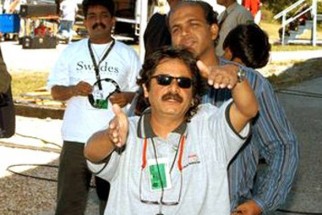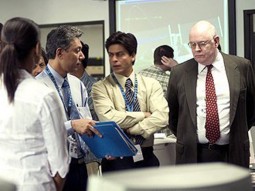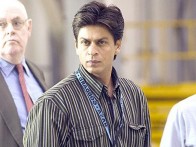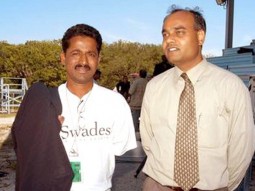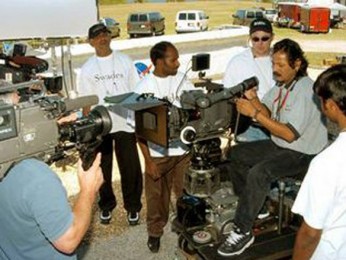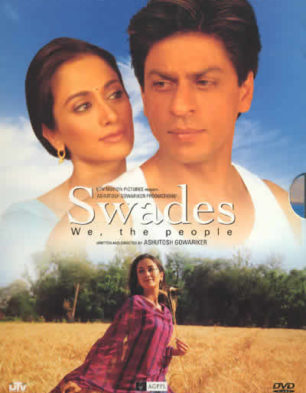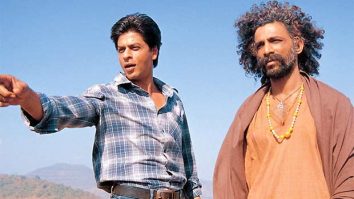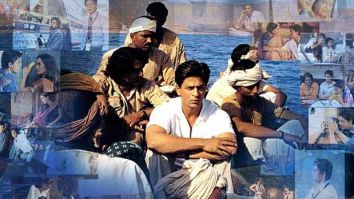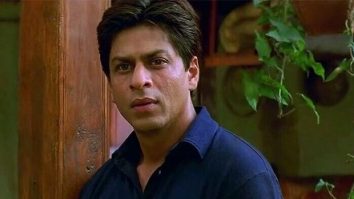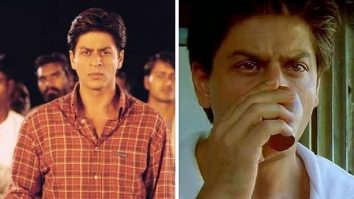Swades Review {1.5/5} & Review Rating
An SRK film is keenly awaited. And if the super-star teams up with a celebrated director whose previous film was nominated for the Academy Awards, the expectations are gargantuan, enormous, colossal.
So when a dynamic combo - SRK and Ashutosh Gowariker - join hands, you expect the film to be, if not better, at least at par with LAGAAN. After all, comparisons with LAGAAN are inevitable!
Unfortunately, SWADES disappoints big time. The story of SWADES would've been ideal for a documentary, but for a feature film with a running time of 3 hour plus and starring the country's biggest star, it just doesn't work.
Yes, SWADES has a few interesting moments. But a handful of deftly executed sequences aren't enough. It had to be one exciting joyride, with the 3 hour plus narrative grabbing your attention from the word 'Go'.
To put it bluntly, SWADES is high on hype, low on substance and extremely low on entertainment. Ashutosh Gowariker has missed the bus this time!
Set in modern day India, SWADES tackles the issue facing the citizens of this nation at grassroots level. The India of SWADES is colorful, heterogeneous and complex and it is to this environment that Mohan Bhargava [Shah Rukh Khan], a bright young scientist working as project manager in NASA, returns to, on a quest to find his childhood nanny.
What begins as a simple mission prompted by nostalgia and affection turns into a journey to the heartland of rural India, both literally and metaphorically.
Mohan finds his nanny, Kaveriamma [Kishori Ballal], the symbol of motherhood, in a village called Charanpur with an admirable young woman Gita [Gayatri Joshi] and her younger brother Chikku [Master Smit Sheth].
Mohan begins to interact with the Panchayat, which has at the helm the dogmatic but the just village chief. Along the way he encounters the quirky but endearing Mela Ram [Dayashanker Pandey], who sees Mohan as his ticket to the chain of restaurants he will start on the American freeways.
Mohan befriends the local postmaster Nivaran [Rajesh Vivek], stuck to his old-fashioned ways, and the village children, whose future is inextricably linked with that of the country. Soon, Mohan finally realizes that it is his scientific temperament as well as his understanding of societal complexities that can drive the villagers to participate in a movement to better their lives.
One of the reasons why SWADES does not hold is because of its waferthin storyline [the story idea - bringing electricity to the village - is reminiscent of the recent MUMBAI SE AAYA MERA DOST]. Frankly, the story of SWADES progresses well till SRK arrives in the village in search of his nanny. But after the initial 30 minutes, the story stagnates. There's not much happening in the narrative and the flashpoint between SRK and Gayatri [he wants Kaveriamma to accompany him to the U.S., she wants Kaveriamma to stay back] is not something that would make the viewer long for the second half.
The post-interval portions are one strenuous ride, with not much being offered in terms of content. And the incidents in the narrative - SRK visiting a faraway village to recover money from a farmer and learning of his miseries, later bringing in electricity to the village, then his decision of returning to the U.S. - are not the type that would involve you completely. Besides, the number of songs in the post-interval portions only slackens the pace of the goings-on. The film could've easily done without a song or two in this half.
You anxiously await the climax of SWADES [partly because LAGAAN had an exhilarating finale] with bated breath, but again, the culmination to the story is sans anything exciting. It's tame and dull!
Director Ashutosh Gowariker may have chosen a subject he was fascinated by, but expecting the audience to be as fascinated by the subject is asking for too much. The story is not as absorbing - it doesn't have the meat to last for 3 long hours - and even the narrative unfolds at a sluggish and lethargic pace. In fact, the narrative gets so boring and cumbersome after a point that you seriously wonder whether the editor [Ballu Saluja] had gone on a holiday or perhaps, he was so fascinated by the director's work that he didn't feel like trimming/deleting the unwanted portions.
Gowariker's screenplay also does not have enough moments that would instantly catch the attention of the masses. For a majority of cinegoers, especially the hoi polloi, the film holds scant appeal. Gowariker's intentions of depicting the problems of rural India may be noble, but it's not too great an idea of entertainment, specifically for that viewer who is thirsting for entertainment and believes in sunshine/feel-good/escapist cinema. Besides, the length only acts as a deterrent.
Even the much-hyped NASA sequences aren't something an ordinary viewer would be ecstatic to watch.
To his credit, Gowariker has drawn fine performances from the cast. And a few sequences do have the masterly strokes of an efficient technician. But that's about it!
A.R. Rahman's music may sound soothing when you hear it, but when viewed with the story, most of the songs are of the 'fast forward' variety. Clearly, there's not one track you carry home after the screening has concluded. In fact, it would be in the best interests of the film to delete a few songs in the second half, for that would perk up the goings-on to an extent. It would prove to be a good exercise in some damage control at least!
Cinematography [Mahesh Aney] is excellent. The rural look has been captured beautifully. Dialogues [K.P. Saxena] are outstanding, but they tend to get into a sermonizing mode after a point.
Shah Rukh Khan is extremely likeable. He stands firm on his feet in dramatic sequences, confirming yet again that he's not merely a super-star, but a super actor as well. Gayatri Joshi makes a confident debut, though she can go easy on her expressions at times. Yet, considering that this happens to be her maiden big screen appearance as also the fact that she's paired with the country's biggest star, Gayatri manages to make her presence felt.
The film has a number of characters, but if one were to choose those who displayed their skills effectively, it would be in this order: Kishori Ballal, Rajesh Vivek and Dayashanker Pandey. Makrand Deshpande gets one song and scene, that's all.
On the whole, SWADES disappoints. At the box-office, the film may appeal to a handful of critics [await the 5-star ratings!] and those who believe in this form of cinema, but for a majority of viewers, SWADES will be remembered as a good opportunity gone waste. Businesswise, not much to look forward to in swades as well as videsh.
